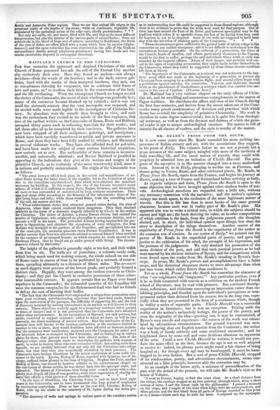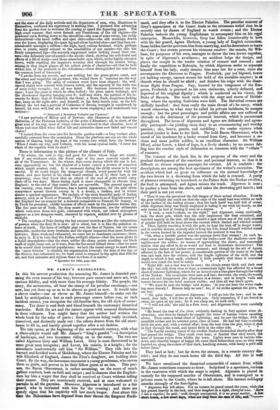MR. READD'S PROSE FROM THE SOUTH.
IT is now some years since Mr. Reade recorded his more striking ha. pressions of Italian scenery and art, with the associations they suggest, in his poem of Italy. The volumes before us are not a prosaic but a prose account of the same subject, mingled with more of the incidents of daily travelling life, and the usual matter of travels, than could with. propriety be admitted into an imitation of Childe Harold. The pro- gress of the narrative is in like manner changed into a more methodical form. Instead of, as in Italy, plunging in mediae res at Florence, and thence going to Venice Rome, and other celebrated places, Mr. Reade„ in Prose from the South, starts from the Thames, and begins his journey at Havre, making a tour of France and Switzerland before arriving at Italy. As regards subjects and form, Prose front the South is open to the same objection that we have brought against other modern books of tra- vels. Archreological anecdotes are expanded into a little tale, without any necessary connexion with the narrative; and the author's opinions occupy too much space, to the exclusion of the more legitimate matter of travels. But this is felt less than in most books of the same general character, because such was in reality part of Mr. Reade's plan. His apparent aim was to write a critical tour, in which the subjects should be nature and high art ; the book deriving its value, as in other compositions of which criticism is the basis, from the judgments passed, the thoughts elicited, and, in short, the individual opinion upon things, less than the story or description of the things themselves. Another source of the superiority of Prose from the South is the superiority of the author to the common run of tourists. In our notice of Italy,* we pointed out the power of Mr. Reade in the superficial parts of poetry, and gave full justice to the cultivation of his mind, the strength of his expression, and the justness of his judgments. We only doubted his possession of the mens divinior of the poet, and said that such poetical powers as he had were marred by his obvious imitation of Byron, and the comparisons which were forced upon the reader from Mr. Reade's treading in Byron's foot- steps. In prose, Mr. Reade's powers and accomplishments have a fuller scope, and his rhetorical eloquence shows to more advantage than when put into verse which rather fetters than condenses it. Yet as a whole, Prose from the South has somewhat the character of what "our neighbours call ' longueura.' " Any particular portion, even if it be so little connected with travels as a criticism on the modern French school of literature, may be read with pleasure. But continued descrip- tions, reflections, and criticisms conveying an impression rather than ex- hibiting principles, and founded upon the individual's perceptions or tem- perament rather than deduced from his reason, tire in the long run, espe- cially when they are presented in the form of a continuous whole, though in reality a series of separable parts. Childe Harold was a successful experiment in literature; but it was an exception. Putting aside the reality of the author's melancholy feelings, the power of the poetry, and even the originality of the idea—growitq out, it may be remembered, of Byron's own travels and experience—the success of the work was stimu- lated by adventitious circumstances. The ground traversed was new, the war having shut out English tourists from the Continent ; the writer was a lord, of family celebrity and some traditional mysteries; and he heightened these by some real and ROLM fictitious allusions to mysteries of his own. Could a new Childe Harold be written, it would not pro- duce the same effect as the first, because the age is not so well adapted to receive it: indeed, its gloomy parts might stand a fair chance of being laughed at ; for though every age may be humbugged, it must be hum- bugged in its own fashion. But a sort of prose Childe Harold, stnpped of its condensation, poetry, and adventitious circumstances, seems con- structed on a false principle, however able the execution may be.
As an example of the better style, a mixture of personification of the past with the actual of the present, we will take Mr. Reade's visit to the house of Voltaire.
"I went to Ferney, hoping to find the coast clear. At a short distance from the village, the carriage stopped at an iron gateway, through which, along a short avenue of trees, I haw the house built by the philosopher. I paused a moment on the steps, and thought of the time when kings were his correapondenbs, and when princes and the first blood from all parts of Europe crowded to this point as to a focus—where each day he held his levee. I conjured up the equipages, and the state of the daily arrivals and the departures of men who, illustrious in themselves, confessed his supremacy in seeking him. I pictured him advancing from his garden-door to welcome the coming or speed the departing guest. The high court manner, that never forsook any Frenchman of the old regime—the powdered curls flowing down to the shoulders—the coat of sober velvet, but richly embroidered—the laced ruffles and open shirt-collar—the silk stockings drawn over the knees, displaying the spare leg and silver-buckled shoe—and that face, un- mistakeable amongst a million—the high, hard, callous forehead, which, perhaps even in youth, rarely relaxed to the sensibilities of our nature—the thin but firmly compressed lips—the scarcely-suppressed satire larking round their cor- ners—the delicately curved nostril—the ascetic cheek, showing the self-denial and effects of a life of study—and those remarkable eyes, which, under highly-elevated brows, while repelling the inquirer's scrutiny. shot through his inmost being, seizing in that single glance all his salient points of character—all that he held within him of the available or the ridiculous,—these distinguished the man from the common herd of humanity. "I awoke from my reverie, and saw nothing but the grass-grown court, and the silent and respectful old gardener, who waited there to marshal me the way that I was going.' The salon of entrance must have been elegant: the well- carved chairs were covered with Geneva velvet, and the tapestry of the walls was of satin richly wrought; but all was faded. His bedroom interested me the most: I saw the glass in which he often looked; the plain oaken bedstead, and the discoloured tapestry hanging over it; half-way down, the portrait of his fa- vourite Le Kiln; that of Frederick the Great, a fierce, fresh, suspicious-looking face, hung on the right side; and himself, in hie forty-fourth year' on the left. Behind the bed was a portrait of Catherine of Russia, wrought in needlework by herself; (it were well had she been never worse employed,) and underneath was written-
Presente A Monsieur Voltaire par l'Auteur.'
"I saw portraits of Milton and of Newton; also likenesses of the luxurious Helvetius, of the Platonist Leibnitz, of the acute d'Alembert; all, in short, of the great men of his day, most of whose voices had echoed in that chamber, most of whom had once filled when full of life and animation those now faded and vacant chairs
"I turned from the room into his favourite garden-walk—a long verdant alley, carefully screened from the mountains. From the platform one can see the whole Gaston of Geneva, being the least of the twenty-two which form the Switzer. When I shake my wig, said Voltaire, with his usual cynical smile, 'I cover the whole of the republic with its dust!"
There is information in this picture of the climate of Italy.
"In winter, the cold is dry, and good for those whose lungs are sound; but if any weakness exist, the finest edge of the razor scarcely equals the sir of the Tramontane. In the winter, days occur during which the sun is hot, even oppressively so; but the shadow of a house causes a reverse of sensation which might produce cold. It is necessary daring the chilly season to be very earefuL If we could forget the dangerous climate, every passer-by with his mouth and nose buried in his cloak would remind us of it: their care is not surprising, since they know that an attack of the mal di petto would carry them off in two days. Rome during April is more changeable in climate than England: to the end of that month fires are agreeable. The general aspect of the country, even round Florence, has a barren appearance; for the pale olives everywhere spread thereon convey to it a dreary, a leafless, and in winter almost a spectral appearance. We exclaim of the most beautiful parts of Italian scenery, such as at 'Tivoli or Frascati, 'This really reminds us of English scenery !' but England has no scenery for a moment comparable to Frascati for beauty, or to Tivoli for grandeur, chiefly because of effects made by the glorious Italian sky. The fine pure air of 'Italy, the deep azure of its firmament, are the alchemists which turn even dross into gold; contrasted with which, our island atmosphere appears as a low dungeon-vault, obscured by vapours, sickliest over by gleams of
sunlight. • •
"The evenings of Italy during the hot summer months are like the exhanstions of passion when the fiery fit is over: all is silent, but it is like the pulseless si- lence of death. The hues of twilight play over the face of Nature, but she seems insensible; unlike the dewy freshness and the rigour imparted from more Northern latitudes. Here, weak and exhausted, we come out to reanimate existence; there, to enjoy it. It is in vain that the Italian twilight allures—that the moon glows in s liquid atmosphere—that the stars, unlike the sharp points studding our black vault of night, come out, as it were from the fine azure behind them—that we seem te be nearer their immortal alalions: we lack the moral energy to meet them; the teens divinior ' is chm , the organization lowered; the heat of the day, or the Sirocco, has exhausted us; we want mind to respond to the spirit that fills the air, and that animates and rejoices those to whom it is native."
• Spectator for 1838, page 494.



























 Previous page
Previous page